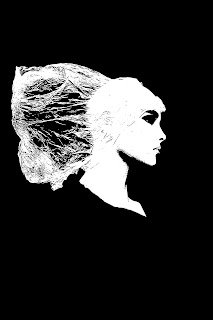["Aphrodite's Child", Lorena Kirk-Giannoulis]
Feinde
der Wahrheit.
– Überzeugungen sind gefährlichere Feinde der Wahrheit als Lügen.
[Friedrich
Nietzsche »Menschliches, Allzumenschliches«; 9.
Hauptstück: Der
Mensch mit sich allein,
Aph. 483 (1878)]
["Moonscape", Lorena Kirk-Giannoulis]
Beharrungsvermögen oder
Trägheit (vis inertiae) ist die Eigenschaft der Materie, im Zustand
der Ruhe oder im Zustand einer bestimmten Bewegung unverändert zu
bleiben, bis durch irgend eine Kraft dieser Zustand geändert wird.
Alle Körper beharren in Ruhe, bis sie bewegt werden. Ein sich
bewegender Körper würde sich ins Unendliche mit unveränderter
Geschwindigkeit und Richtung fortbewegen, brächten ihn nicht Kräfte,
z. B. die Reibung, zur Ruhe oder veränderten seine Geschwindigkeit
und Richtung. Das Beharrungsgesetz war im Altertum unbekannt.
Bei Galilei (1564-1641)
hat es die Fassung: Ein Körper, der auf einer wagerechten Ebene in
Bewegung gesetzt wird, würde sich, insofern kein Hindernis vorhanden
ist, geradlinig und gleichförmig ohne Aufhören weiterbewegen, wenn
die Ebene sich bis ins Unendliche ausdehnte. Wir fassen es jetzt
allgemeiner in die Form: Ein Körper, auf den keine Kraft wirkt,
ändert seinen Bewegungszustand nicht, d. h. er verharrt in dem
Zustande der Ruhe oder der gleichförmigen geradlinigen Bewegung.
Vgl. Poske, Oberstufe der Naturlehre, Leipzig 1907, § 7 und § 14.
Vgl. Substanz, Materie, Trägheit. [Friedrich
Kirchner »Wörterbuch der philosophischen Grundbegriffe« (1907)]
Trägheit heißt
in der Mechanik und Physik die
Eigenschaft der Materie, kraft deren sie im Zustande der Ruhe oder
Bewegung, in welchem sie sich befindet, beharrt, wenn keine
entgegenwirkende Kraft auf sie einwirkt. Das Gesetz der Trägheit
(lex inertiae) lautet: »Ein ruhender Körper fährt fort zu ruhen,
wenn nicht eine Ursache ihn bewegt, und ein bewegter Körper fährt
fort, sich in gleicher Richtung und Geschwindigkeit zu bewegen, wenn
nicht eine Ursache diese Richtung oder Geschwindigkeit ändert oder
aufhebt.« Da nun die einwirkende Kraft eine Rückwirkung von dem
anderen Körper erleidet, so hat man diesen Widerstand als Kraft der
Trägheit (vis inertiae) bezeichnet. Erst die neuere
Naturwissenschaft hat dieses Gesetz aufgestellt; dem Aristoteles war
es unbekannt. - Im moralischen Sinne
ist Trägheit die Unlust zur Arbeit und die Neigung, sich nicht
anzustrengen. Nach J. G. Fichte (1762
bis 1814) ist die Trägheit das Radikalböse im Menschen. [Friedrich
Kirchner »Wörterbuch der philosophischen Grundbegriffe« (1907)]
["Dolls", Lorena Kirk-Giannoulis]
Is
not that government both unjust and ungrateful, that is so prodigal
of its favours to those that are called gentlemen, or goldsmiths, or
such others who are idle, or live either by flattery or by contriving
the arts of vain pleasure, and, on the other hand, takes no care of
those of a meaner sort, such as ploughmen, colliers, and smiths,
without whom it could not subsist? But after the public has reaped
all the advantage of their service, and they come to be oppressed
with age, sickness, and want, all their labours and the good they
have done is forgotten, and all the recompense given them is that
they are left to die in great misery. The richer sort are often
endeavouring to bring the hire of labourers lower, not only by their
fraudulent practices, but by the laws which they procure to be made
to that effect, so that though it is a thing most unjust in itself to
give such small rewards to those who deserve so well of the public,
yet they have given those hardships the name and colour of justice,
by procuring laws to be made for regulating them.
Therefore
I must say that, as I hope for mercy, I can have no other notion of
all the other governments that I see or know, than that they are a
conspiracy of the rich, who, on pretence of managing the public, only
pursue their private ends, and devise all the ways and arts they can
find out; first, that they may, without danger, preserve all that
they have so ill-acquired, and then, that they may engage the poor to
toil and labour for them at as low rates as possible, and oppress
them as much as they please; and if they can but prevail to get these
contrivances established by the show of public authority, which is
considered as the representative of the whole people, then they are
accounted laws; yet these wicked men, after they have, by a most
insatiable covetousness, divided that among themselves with which all
the rest might have been well supplied, are far from that happiness
that is enjoyed among the Utopians; for the use as well as the desire
of money being extinguished, much anxiety and great occasions of
mischief is cut off with it, and who does not see that the frauds,
thefts, robberies, quarrels, tumults, contentions, seditions,
murders, treacheries, and witchcrafts, which are, indeed, rather
punished than restrained by the seventies of law, would all fall off,
if money were not any more valued by the world? Men's fears,
solicitudes, cares, labours, and watchings would all perish in the
same moment with the value of money; even poverty itself, for the
relief of which money seems most necessary, would fall. [Thomas
More »Utopia« (1516), translated from Latin by Gilbert Burnet in
1901]







Keine Kommentare:
Kommentar veröffentlichen